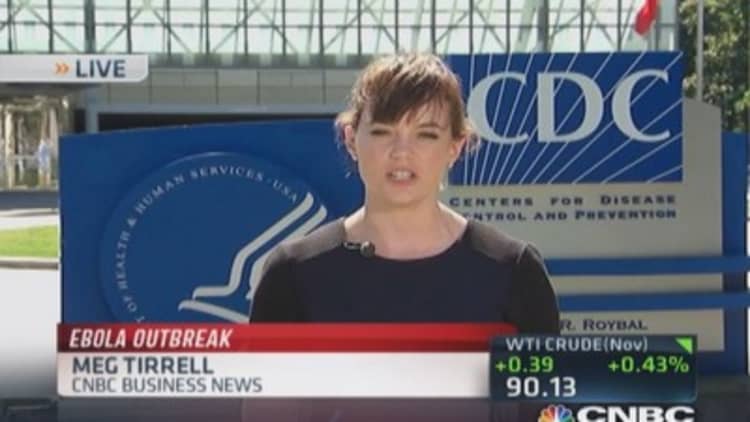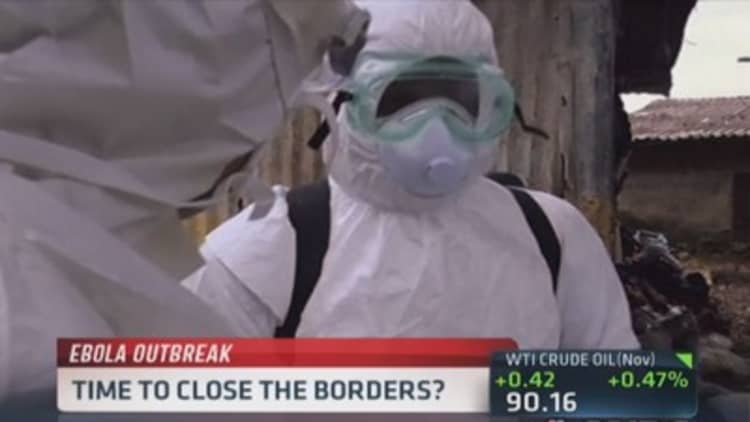
The Ebola victim being treated in Dallas is now receiving an experimental drug after federal authorities gave the go-ahead for its use in emergency cases, the hospital said Monday.
The disclosure that Thomas Eric Duncan began receiving the drug brincidofovir came hours after its maker, Biopharma company Chimerix announced that the antiviral drug has been approved for emergency use in Ebola patients.
"Mr. Duncan remains in critical condition," said Candace White, spokeswoman for Texas Health Presbyterian Hospital in Dallas. "His condition is stable. He is now receiving the investigational medication brincidofovir." Duncan contracted Ebola in the West African country of Liberia, but was diagnosed after traveling to the US.
Other Ebola patients soon could also be receiving the drug as a result of the Food and Drug Administration's decision to approve it on a compassionate-use basis.
Brincidofovir joins two other experimental antiviral drugs that have already been deployed in the battle against Ebola.
Read MoreBrace for another Ebola patient in US: CDC chief
ZMapp was initially used in a few patients, but the supply of the drug produced by MAP Pharmaceuticals has run out. Tekmira Pharamceutical's TKM-Ebola also has received clearance from the FDA for expanded access by doctors treating Ebola patients. Doctors for another Ebola patient, NBC News freelance cameraman Ashoka Mukpo, said they do not know if he will receive one of those drugs. Mukpo is being treated at a Nebraska hospital after arriving in the U.S. from Liberia on Monday morning.
The disease has killed at least 3,439 people since an outbreak in West Africa in March, according to Reuters.

Chimerix also said Monday it is "working closely with the" FDA to finalize a protocol for a clinical trial early this week to assess the safety and efficacy of brincidofovir in patients confirmed to have Ebola. The news sent the company's stock jumping more than 8 percent in afternoon trading.
Testing in vitro in animal models with Ebola are "currently underway," the company said.
"Chimerix is committed to working with global health organizations and government agencies in the fight against the Ebola virus outbreak," said Dr. M. Michelle Berrey, Chimerix's CEO. "Based on in vitro data from work conducted by the CDC and the National Institutes of Health suggesting brincidofovir activity against Ebola, we are hopeful that brincidofovir may offer potential treatment for Ebola virus disease during this outbreak."
Read MoreNBC News freelancer with Ebola arrives on US soil
Berrey was referring to testing at the Viral Special Pathogens Branch of the federal Centers for Disease Control and Prevention and the NIH that showed brincidofovir had, in test tubes, showed "activity" against the Ebola virus that was comparable to how the drug performed against other viral diseases, including smallpox and adenovirus.
Chimerix also noted that clinical data collected during Phase 3 testing of brincidofovir for use in patients with cytomegalovirus and adenovirus infection have shown it be safe, which opened the door for an investigation into whether it is a potential therapy for Ebola.
The FDA had no comment, citing a policy of not talking about drugs that are in development.
Read MoreEbola and the electronic health record gap
The investment bank Piper Jaffray last week had noted that Chimerix "may be an underappreciated player in the Ebola field with unique positioning for brincidofovir and for the company as an investment opportunity."
However, the bank warned on Monday that "figuring out clinical success" of the drug "may be a challenge," because of the ethical issues of evaluating the drug "in a placebo-controlled study," where some patients suffering from Ebola would not get the pill.
Also Monday, Leerink downgraded Tekmira Pharmaceuticals to "market perform" from "outperform" after re-evaluating the company's prospects with its Ebola drug following a more than 200-percent price rise in the stock price since July.
Leerink said that any significant potential profits from sales of the TKM-Ebola "is now baked into the stock."
Leerink's downgrade was based on an analysis that Tekmira added $340 million in market valuation since the summer, which can only be justified if the company receives significantly more orders for stockpiling the drug than is likely at the moment.


